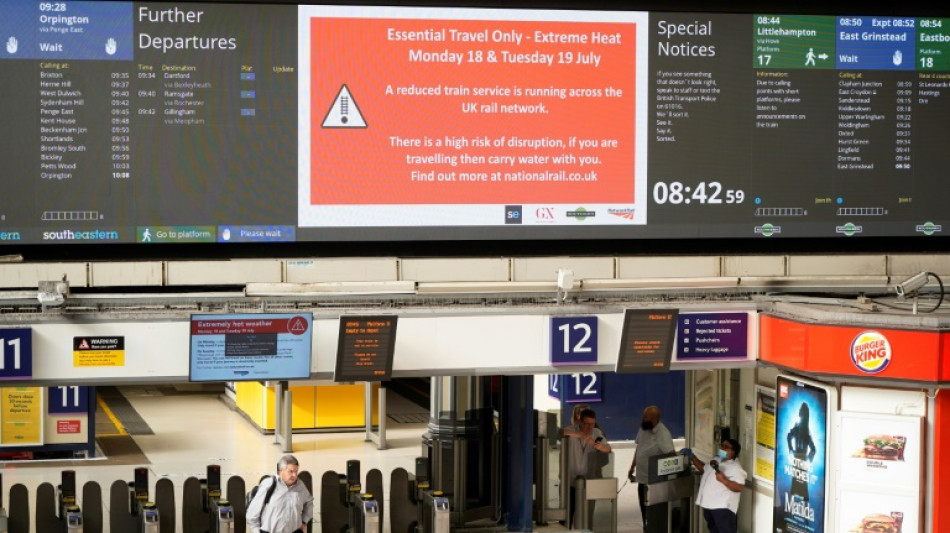
Britain, France brace for hottest day as Europe fires rage

Britain and France went on heatwave alert on Monday bracing for record temperatures as southwest Europe wilted under a scorching sun and ferocious wildfires devoured more forests.
Britain could hit 40 Celsius (104 Fahrenheit) for the first time, forecasters said, causing havoc in a country unprepared for the onslaught of extreme heat that authorities said was putting lives at risk.
Britain's current record temperature stands at 38.7 Celsius. Scientists blame climate change and predict more frequent and intense episodes of extreme weather.
Across the Channel firefighters failed to contain two massive fires in France's southwest that have created apocalyptic scenes of destruction.
For six days, armies of firefighters and a fleet of waterbombing aircraft have struggled against blazes that have mobilised much of France's entire firefighting capacity.
Forecasters have put 15 French departments on the highest state of alert for extreme temperatures, including in the western Brittany region where the Atlantic coastal city of Brest was expected to hit 40 Celsius Monday, nearly twice its usual July temperature average.
The European heatwave, spreading north, is the second to engulf parts of the southwest of the continent within only weeks.
- 'Heat apocalypse' -
Blazes burning in France, Greece, Portugal and Spain have destroyed thousands of hectares of land and forced thousands of residents and holidaymakers to flee.
In France's Landes forest, in the southwest Aquitaine region, temperatures "will be above 42 degrees Celsius" on Monday, forecaster Olivier Proust said.
In the Gironde region, further north, firefighters on Monday continued their battle against forest blazes that have devoured nearly 14,000 hectares (35,000 acres) since Tuesday.
An area of nine kilometres (5.5 miles) long and eight kilometres wide was still ablaze near the Dune de Pilat, Europe's highest sand dune, turning picturesque landscapes, popular campsites and pristine beaches into a scorching mess.
Firefighters said Monday was shaping up to be one of the most challenging days since the fires started because of the relentless heat, as another 3,500 people were being told to leave their homes as a precaution.
The wildfires in France have forced more than 16,000 people, residents or tourists, to decamp. Seven emergency shelters have been set up for evacuees.
France's interior ministry announced it would send an extra three firefighting planes, 200 firefighters and more trucks.
"In some southwestern areas, it will be a heat apocalypse," meteorologist Francois Gourand told AFP.
- Temperatures hit 47C -
The chapel of a historic hospital in the southeast city of Lyon, Grand Hotel Dieu, offered refuge to tourists on Sunday including Jean-Marc, 51, who was visiting from Alsace.
"We came back to admire the place, but we can't leave, it's too hot outside. We say a prayer before the fire!" he quipped.
French cyclist Mikael Cherel, taking part in the Tour de France's 15th stage between Rodez and Carcassonne in southern France on Sunday, said he had "never known such a hot day on a bike".
In Spain, fire burning in the northwestern province of Zamora claimed the life of a 69-year-old shepherd, regional authorities said, the second death after that of a fireman a day before in the same area.
Authorities have reported around 20 wildfires still raging from the south to Galicia in the far northwest, where blazes have destroyed around 4,500 hectares of land.
In Portugal, almost the entire country remained on high alert for wildfires despite a slight drop in temperatures which had hit 47C -- a record for the month of July -- last Thursday.
- 'So ferocious' -
Fires have killed two, injured around 60 and destroyed between 12,000 and 15,000 hectares of land in Portugal.
In London, the mercury was set to rise to highs of 38C on Monday as chief meteorologist Paul Davies warned there was a "good chance now of hitting 40C or 41C" on Tuesday.
"This is entirely consistent with climate change," he told Sky News, describing the "brutality" of the expected heat as "astounding".
The government, already on the ropes after a series of scandals and Prime Minister Boris Johnson's resignation, drew fresh criticism for failing to take the situation seriously enough.
Many people fled to the beaches, including Abu Bakr, a bank worker, who put the British heatwave into perspective.
"I come from Sudan," he told AFPTV on Brighton beach on Sunday. "Forty, forty-five degrees is just the norm. This is as good as it can be."
burs-jh/jm
(F.Schuster--BBZ)

 London
London

 Manchester
Manchester
 Glasgow
Glasgow
 Dublin
Dublin
 Belfast
Belfast
 Washington
Washington
 Denver
Denver
 Atlanta
Atlanta
 Dallas
Dallas
 Houston Texas
Houston Texas
 New Orleans
New Orleans
 El Paso
El Paso
 Phoenix
Phoenix
 Los Angeles
Los Angeles


